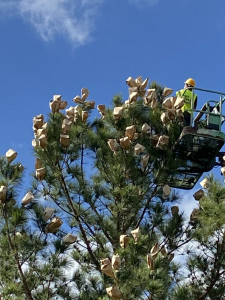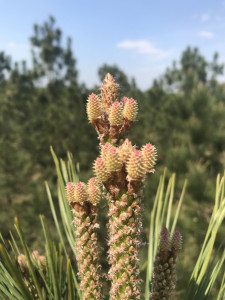It’s that special time of year in Georgia, when Mother Nature coaxes everything around us to sprout, bloom, and reach for the sunshine. For many people, however, it’s the most miserable time of year, when all the pollen, both visible and invisible, wreaks havoc on human bodies.
Despite its shady reputation with some, we’d be nowhere without pollen. Think birds and bees and the many wonderful benefits we get from everything that grows out of the ground.

At the Georgia Forestry Commission, pollen is a critical part of the Reforestation Department’s mission. Pine pollen plays an important role in the generation of superior trees that are cross-bred for desirable qualities. Reforestation staff collects and processes thousands of milliliters of pollen each spring to do controlled crosses in our seed orchards. This is done so that two superior parents can be mated for the production of seed that is superior for growth and stem form in our seedlings.
Tree pollen season starts in January in South Georgia with slash pine. Loblolly pine pollen has been flying in south and central Georgia since late February/early March. Pollen season progresses through March and April, usually concluding by late May in the northern parts of our state. This year’s pollen began a little earlier than last year because we’ve been experiencing warmer, drier days.
Pollen counts are usually highest on those warm and dry days. If you suffer from seasonal allergies, your best time to enjoy outdoor activities is late afternoons or right after it rains.
Did you know that not all pollen is yellow? The pine pollen we’re seeing now is not as much of an irritant as the invisible types because it is rounder and smoother. Pollens from hardwoods, weeds, and grasses are more irritable to those who suffer from allergies.

There’s no time for a breather once spring tree pollen has subsided and your cars are washed. Grass pollen is next on the scene and that lasts through June and July for some species of grass. The fall pollen season kicks in by late August with ragweed and other fall weeds.
Seasonal progression for pollen is from south to north. The southern part of the state is usually a week or so ahead of the northern half, depending on the weather. (And are you feeling a wee bit more appreciation for winter right about now?)
No matter where you live in Georgia, pollen will always be part of your life. Whether it’s a call for gratitude or a call for Claritin, it’s a dependable natural process that keeps our world on track.
